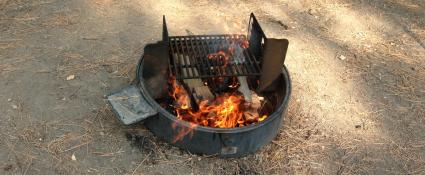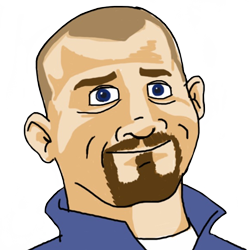
In order to build and maintain a fire, you need three components: fuel, heat and oxygen. When it comes to heat and oxygen, the more you have of one, the less you need of the other. When your fuel is more dry or combustible then you need less heat or oxygen to spark a flame.
As I was camping with my son, we decided to try a little experiment with our campfire. We had a fire that had been burned out for a few hours and had no smoke at all. I decided to stack my firewood in preparation for the cooking fire even though I knew I wouldn't need it for a few hours.
Within a few minutes of setting up the log cabin, one of the logs that had been buried in ash started smoking and caught fire. It was much hotter than I realized.
Since I didn't want to start my cooking fire that soon, I poured a bunch of water over all the wood. It then seemed very cold.
The experiment was that when we were ready to start the campfire, we would just put a lot of dry pine needles in and around the log cabin. Within about 5 minutes, one little spot started smoking. I wanted to see how much time it would take for the fire to start on it's own.
After about 20 minutes, the smoking got a little more pronounced. Every so often, the wind would pick up and the smoke would increase. I was a little tired of waiting so I decided to help it along by blowing on the smoldering spot a little. Within about 30 seconds of my blowing, the fire was burning and 30 seconds later the log cabin was completely engulfed. With just a little work, I was able to get the fire going.
You might think this is a story about you being the only one that can prevent forest fires. While that is a good lesson to learn I was thinking a bit about my employees and their talents while I was watching the fire start. I was thinking how it could apply to fostering the skills of those whom you lead.
When I hire people, I look for attitude and ability to grow and learn. I look for potential. Sure, I've hired people that have a skill set and experience level that can help me out but I want people that will learn more while they are working for me. I want them to continue to bring more to the table than they already have.
I am looking for the burning ember. The ember that, if I provide the right fuel (resources, opportunity, etc) and properly fan the flame (encouragement, training, etc), they can make a raging fire.
Each of us has that ember. Each of us has the little spark. It takes work to make it into a fire. When we get that fire burning, we can do amazing things.
Oh, and only you can prevent forest fires.

